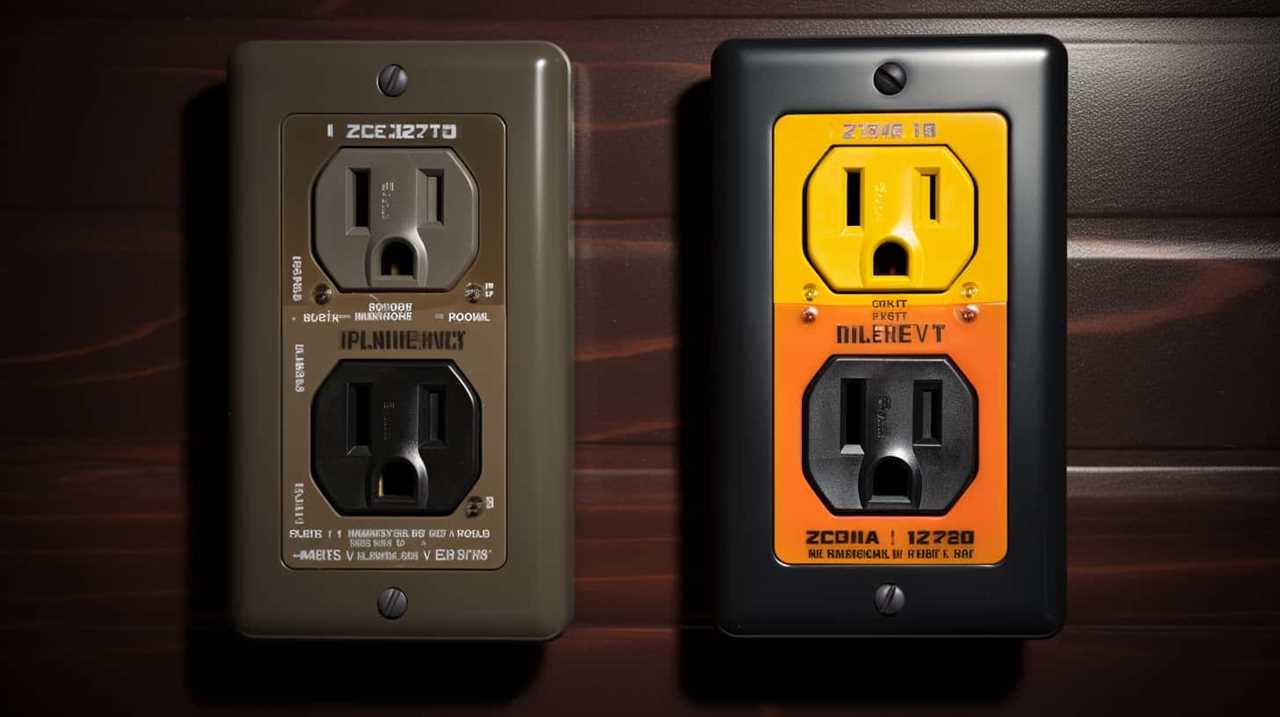Are you aware that using the incorrect cable size for your appliances can cause inefficiency and higher energy usage? Research indicates that using a cable that is too small can lead to a loss of up to 10% in energy.
That’s why it’s essential to understand the factors influencing cable thickness and how to determine the right cable size for your appliances. In this article, we will explore the importance of proper cable sizing and common cable sizes for appliances.
Key Takeaways
- Selecting the right cable is crucial to ensure the safe and efficient operation of appliances.
- Using a cable that is too small can lead to energy loss, inefficiency, and higher electricity bills.
- On the other hand, using a cable that is too large can be wasteful and costly.
- Proper consideration of factors such as the appliance’s power requirements, distance from the power source, and voltage drop is necessary for determining the correct cable size.
Cable Size and Appliance Efficiency
When considering cable size and appliance efficiency, we must understand the correlation between the two. Cable resistance plays a crucial role in determining the optimal cable size for an appliance. As the current flows through a cable, it encounters resistance, leading to a voltage drop. This voltage drop can affect the efficiency and performance of the appliance. By using a cable with lower resistance, we can minimize the voltage drop and ensure that the appliance receives the required voltage for optimal operation.
Additionally, cable resistance is closely tied to electrical safety. When a cable carries high current, it generates heat due to the resistance. If the cable isn’t properly sized to handle the current, excessive heat can build up, increasing the risk of fire or damage to the cable insulation. Therefore, it’s crucial to choose the right cable size to ensure electrical safety and prevent hazards.

Factors Influencing Cable Thickness
To determine the appropriate cable thickness for appliances, several factors influence our decision-making process. When selecting the cable material, it’s important to consider its conductivity, durability, and resistance to environmental factors. Additionally, the length of the cable plays a crucial role in determining its thickness. Longer cables require thicker conductors to minimize voltage drop and ensure efficient power transmission.
Cable length limitations must also be taken into account, as exceeding these limits can result in decreased performance and potential safety hazards. Finally, the specific appliance’s power requirements and operating conditions should be considered to determine the optimal cable thickness. These factors collectively impact the overall performance and safety of the appliance. Understanding these influences is vital for making informed decisions regarding cable thickness.
Transitioning into the subsequent section about the importance of proper cable sizing, it’s essential to recognize that choosing the right cable thickness is crucial for ensuring efficient and safe operation of appliances.
Importance of Proper Cable Sizing
Proper cable sizing is crucial for ensuring efficient and safe operation of appliances. It’s important to select a cable that can handle the electrical load of the appliances it’s connected to. Undersized cables can have a negative impact on the performance and lifespan of appliances.

When cables are undersized, they can overheat, leading to potential electrical fires. Additionally, undersized cables can cause voltage drops, affecting the efficiency and performance of appliances.
To determine the appropriate cable size, a cable size calculator can be used. This tool takes into account factors such as the electrical load, distance, and voltage drop. By using a cable size calculator, the risk of using undersized cables can be minimized, ensuring optimal performance and safety of appliances.
Common Cable Sizes for Appliances
Now let’s delve into the common cable sizes for appliances, as we continue our discussion on the importance of proper cable sizing.
When it comes to selecting the appropriate cable size for your appliances, two crucial factors to consider are the wattage of the appliance and the material of the cable.

Here are five key points to keep in mind:
- Appliance wattage: Determine the wattage of your appliance to accurately gauge the power requirements. This information is typically provided by the manufacturer and can guide you in selecting the right cable size.
- Cable material: Different cable materials have varying ampacity ratings, which determine the maximum current they can safely carry. Copper cables are commonly used due to their high conductivity and durability.
- Voltage drop: Ensure that the selected cable size minimizes voltage drop, as excessive voltage drop can lead to performance issues and potential damage to the appliance.
- National Electrical Code (NEC): Familiarize yourself with the NEC guidelines to ensure compliance with safety standards and to understand the recommended cable sizes for different wattages.
- Consult an electrician: When in doubt, it’s always advisable to consult a qualified electrician who can assess your specific needs and provide expert guidance on the appropriate cable size for your appliances.
How to Determine the Right Cable Size for Your Appliances
We can determine the right cable size for our appliances by considering several key factors.
First and foremost, cable size plays a critical role in ensuring safety precautions are met. It’s crucial to select a cable that can handle the electrical load without overheating or causing a fire hazard.
Additionally, cable size directly affects energy consumption. A cable that’s too small may result in energy loss and inefficiency, leading to higher electricity bills. On the other hand, using a cable that’s too large can be a waste of resources.

To determine the appropriate cable size, it’s necessary to consider the appliance’s power requirements, distance from the power source, and voltage drop.
Frequently Asked Questions
What Are the Potential Risks or Dangers of Using an Undersized Cable for an Appliance?
Using an undersized cable for an appliance can lead to potential electrical hazards. It is crucial to ensure proper cable sizing to prevent overheating, excessive voltage drop, and possible damage to the appliance.
Can Using a Thicker Cable Than Necessary for an Appliance Cause Any Issues?
Using a thicker cable than necessary for an appliance is like wearing a heavy winter coat in the summer. While it won’t necessarily cause issues, it may affect the electrical efficiency and overall system performance.
Are There Any Regulations or Guidelines Regarding Cable Sizing for Different Types of Appliances?
Regulations and guidelines exist for cable sizing in relation to different types of appliances. It is important to adhere to these standards to ensure proper functioning and safety.

How Can I Determine the Maximum Load or Power Requirement of My Appliance?
To determine the maximum load or power requirement of an appliance, we need to calculate its load capacity. This calculation involves considering factors such as voltage, current, and power consumption.
Are There Any Specific Safety Measures or Precautions to Consider When Installing or Replacing Appliance Cables?
When it comes to safety precautions and proper cable installation for appliances, it is crucial to follow manufacturer guidelines, ensuring the correct wire gauge and proper grounding to prevent electrical hazards.
Conclusion
In conclusion, it’s crucial to use the appropriate cable size for your appliances to ensure optimal efficiency and safety.
One interesting statistic to note is that using a cable that’s too thin can result in a 4% loss of energy, leading to higher electricity bills.

By investing in thicker cables that can handle the required power load, you can reduce energy loss and improve the overall performance of your appliances.









